
An Idaho woman found to have left out food and garbage that a grizzly bear got into was fined nearly $6,000, part of which covered the cost of a tracking collar placed on the bear and its trip across Jackson Lake (above photo) in Grand Teton National Park/NPS file
An Idaho woman who failed to properly store food and garbage at her site in a Grand Teton National Park campground and which a grizzly bear got into was fined nearly $6,000, part of which covered the cost of placing a tracking collar on the bear and relocating it, according to a U.S. Justice Department release.
Belinda J. Arvidson, 50, hometown not released, "failed to properly store garbage and beverages resulting in a grizzly bear receiving a food reward when it found the unattended garbage and drink at the campsite," said the release issued Friday. "Individuals camping in the area took photos and videos of the grizzly bear while it was in Arvidson’s campsite rummaging through the trash and other food items. The campground contained multiple warning signs about bears and proper food storage as well as bear boxes in which food and other items could be stored."
The sentence was handed down July 20 by U.S. Magistrate Mark L. Carman in Mammoth Hot Springs.
Park staff tracked down the bear, tranquilized it, fit it with a radio collar, and took it by boat across Jackson Lake to be relocated.
"It could pose a danger to humans if the bear were to have another similar incident, and euthanizing the bear may become necessary," the DOJ release said. "The amount of restitution to be paid by Arvisdon covers the National Park Service’s costs for this operation, including the cost of a GPS collar now necessary to track the bear’s movement."
“Irresponsible behaviors have consequences, and many times it is the wildlife that pays the ultimate price," said Grand Teton Superintendent Chip Jenkins. "We all have responsibilities to preserve and protect the incredible wild animals of Grand Teton National Park and the Greater Yellowstone Ecosystem.”
The bear apparently had figured out that a campground along the Grassy Lake Road on the northern end of the park was a good place to look for food.
On June 11, a visitor reported that a grizzly bear walked through a Grassy Lake Road campsite on the northern end of the park, sniffed a picnic table and unoccupied tent, and put its paws on the tent. No damage was done to the tent. Visitors yelled at the bear and the bear ran away. On June 12, Teton Interagency Dispatch Center received a report of visitors feeding a grizzly bear from a vehicle south of Lizard Creek Campground, also near the park's northern end. On June 13, Teton Interagency Dispatch Center received a report of a grizzly bear gaining access to unattended trash and a drink at a campsite located on the outer loop of the Headwaters Campground.
All reports and evidence indicated that the same grizzly bear was involved with each incident, a park release said. Late on June 13 park staff captured the grizzly bear along the Grassy Lake Road. On June 14, the bear was collared and biological samples were collected. The bear is a young male that is approximately 2.5 years old. The bear was relocated on June 15 via boat to the west side of Jackson Lake.
Grizzly bears and black bears thrive in Grand Teton National Park and the John D. Rockefeller, Jr. Memorial Parkway. Odors attract bears into parking lots, campgrounds, and picnic areas. All food and items with a smell must be stored in a bear-resistant food storage locker or in a hard-sided vehicle with the doors locked and windows closed day and night. Never store food, garbage, or toiletries in tents. For information about bear safety in Grand Teton National Park visit Safety in Bear Country - Grand Teton National Park.



Comments
Another news article said she was from Parma, Idaho.
Let's hope the bear's internal organic GPS won't return him to the campsite.
It will probably come back as it will associate the area with food. If that happens, they might have to put the bear down, which is horrible, just because someone thought the rules didn't apply to them. That's tragic.
Sorry to hear about the bear... Glad the law has some teeth! And kudos to the people who reported it to the NPS so the woman could be fined.
Remember, folks, all too often, a fed bear is a dead bear.
They forgot to mention that the bear was there 2 days prior rummaging through things, as well as the bear had already been once removed and relocated. Why weren't park officials removing the bears then?
Hold All people responsible for their actions.....make the consequences hurt with fines, jail time or being Banned from the park or parks !!!
I wholeheartedly support Parks enforcement and fines in order to protect these wild bears, which have nowhere else to live. We are camping in their remaining habitat, and when they leave the Park they are often killed. I feel somewhat sorry for this woman, provided that she feels sorry and won't repeat this behavior -- but this fine is totally the right thing to do. Parks have been seriously underfunded for decades, and I hope they can recover these costs.
Where you get the idea that they have nowhere else to live? They're not fenced in and there's a range for grizzlies that extends into Montana. Except for the occasional depredation permit, I don't believe they're just killed because they find their way outside of national parks. And there are tons of grizzlies in Canada living reasonably close to populated areas. In Alaska, grizzlies can be seen wandering the streets of cities like Anchorage or Juneau.
I don't like the idea of improper food storage leading to human-bear conflicts, but keeping people out of the area isn't going to be workable either.